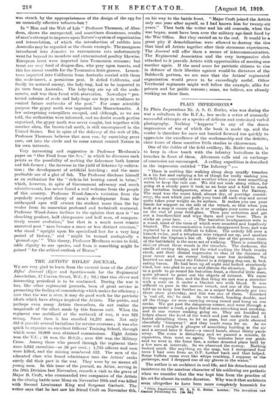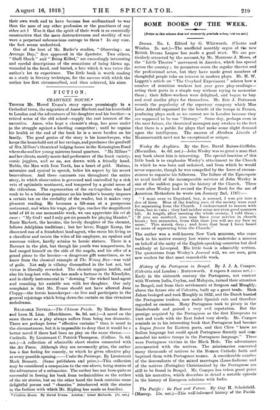PLAIN IMPRESSIONS.*
Ix Plain Impressions Mr. A. S. G. Butler, who was during the war a subaltern in the R.F.A., has made a series of unusually successful attempts at a species of delicate and restrained verbal photography. Nothing " happens " in any of the dozen impressions of war of which the book is made up, and the reader is therefore for once not hurried forward too quickly to appreciate the excellence of the workmanship and the definite, clear tones of these sensitive little studies in chiaroscuro.
One of the duties of the field artillery, Mr. Butler remarks, is to keep in close touch with the infantry battalions in the trenches in front of them. Afternoon calls and an exchange of courtesies are encouraged. A calling expedition is described in the impression entitled " The Infantry " :-
"There is nothing like walking along deep muddy trenches in a tin hat and carrying a lot of things for really making you stickily hot—especially in wet weather when you wear something extra to keep the rain out. We did not rush along either, for going at a steady pace it took us an hour and a half to reach the battalion headquarters, about a mile from the Battery. The mud was the worst kind, almost dry, of porridge consist- ency, the sort which just pulls your boot off each step and never quite takes your weight on its surface. It makes you use your hands for support on the side of the trench, so that when you look at a map it comes off on it or smudges your notes or sticks on the end of your field-glass. Then you unbutton and get out a handkerchief and wipe them and your brow. Then it sticks on your face. . . . The battalion headquarters were in a wood, most of the trees of which were smashed and hopelessly blasted. The communicatio n trench disappeared here, and was replaced by a track difficult to follow. The orderly fell over a branch twice, and a telephone wire tripped me up, and another knocked the Captain's hat off. Quite one of the greatest trials of the battlefield is the mere act of walking. There is something sinister about these woods in the trenches. The darkness, the smells of rotting things, and the wind making the black trunks creak, add their dismal impression to that of the thinness of your cover and an enemy lurking near but invisible. We hurried on and found the Colonel in a dripping dug-out, in bed, eating bacon. He had been up all night and looked atrociously tired, but was glad to see us and discuss the situation. He gave us a guide to go round his battalion front, a cheerful little man, quite pleased to point out the objects of interest. We came into the support line, and the first thing we met was a stretcher with a man on it under a blanket wet with blood. It was difficult to pass in the narrow trench, and one of the bearers told us to keep low further on, as a sniper had already got two there since yesterday, and this was one of them. ' Knocked 'is 'ead off, sir,' he said. So we walked, bending double, and all the things we were carrying swung round and hung on our necks. We got past the dangerous corner, and went through a passage under a road, a place full of men crouching and smoking, and in one corner cooking going on. They sat huddled on ledges above the level of the water and just under the roof. I hated disturbing them to let us pass, but our guide shouted cheerfully ' Gangway ! ' and they made room for us. As we came out I caught a glimpse of something hurtling in the air and a second later it burst—a vaned bomb, about thirty yards away. The noise is disturbing and we paused a minute, lit cigarettes, then went on again. Ten minutes later our guide said we were in the front line, a rather deserted place held by a few men at intervals. So we observed the enemy. Nothing looked much like anything on the map, but I recognized four trees I had seen from an O.P. further back and that helped. Some bullets came over like whips cracking, I suppose at the periscope, and I dropped one of my gloves in the water."
The author is an architect in real life, and his detachment and insistence on the amateur character of his soldiering are pathetic when we consider that the war kept him from the practice of his art for almost its entire duration. Why was it that architects seem altogether to have been more completely homesick for • Plain Impressions. By A. 8. G. Butler. London: The Aeroplane and General Publishing Co. [2a. ed.)
their own work and to have become less acclimatized to war than the men of any other profession or the practisers of any other art ? Was it that the spirit of their work is so essentially constructive that the mere destructiveness and sterility of war were a perpetual subconscious outrage to them Y In any case, the fact seems undoubted.
One of the best of Mr. Butler's studies, " Observing : an Average Day," first appeared in the Spectator. Two others, " Shell Shock" and " Being Killed," are exceedingly interesting and careful descriptions of the sensations of being blown up, wounded in the head, and buried, a fate which it was twice the author's lot to experience. The little book is worth reading as a study in literary technique, for the success with which the author has first circumscribed, and then achieved, his aims.



































 Previous page
Previous page